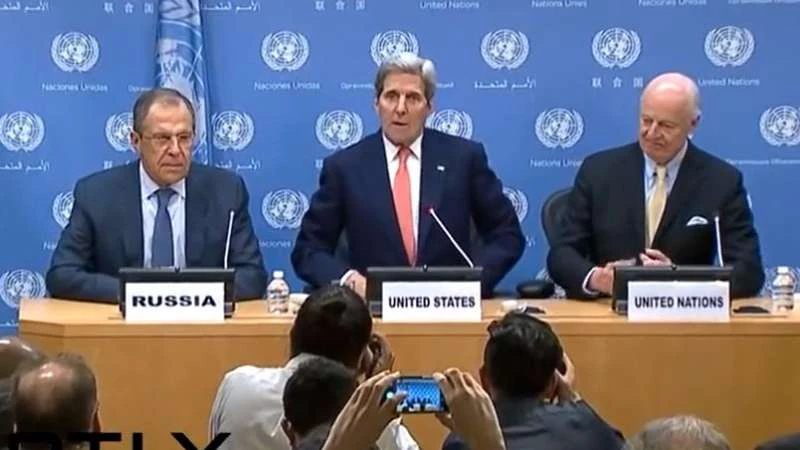Kerry started his speech saying: "So we’ve already shown that it’s possible to get all of the major international partners to agree on a set of common objectives. In fact, all of the international parties – some that are not partners – have agreed on the objectives. And it’s possible, we’ve proven, to reduce the level of violence. It is possible to expand humanitarian assistance. And it’s possible to design a framework and set a timeline for the kind of viable and inclusive negotiating process that we need in order to bring about a political transition and to put an end to this terrible conflict."
Kerry went to speak about what has been achieved saying: "So today, we believe we moved the ball forward in some ways, and I’ll say specifically:
First, we pledged our support for transforming the cessation of hostilities into a comprehensive ceasefire. And we committed to use our influence to use the parties to the cessation in order to ensure compliance.
"Second, we agreed that if a party to the cessation of hostilities engages in a pattern of persistent noncompliance, the task force can refer that behavior to the ISSG ministers or those designated by the ministers to determine appropriate action, including the exclusion of such parties from the arrangements of the cessation. Interpreted directly, that means that if they continue to do it and they’re pretending to be part of the cessation and they’re not, they could be subject to no longer being part of the cessation immediately. In addition to that, we underscored the failure of the cessation of hostilities or granting access to the delivery of humanitarian relief that we’ve already seen in some instances. And if that continues, that will increase international pressure and potentially other actions on those who do not live up to those commitments.
"Third, we will intensify efforts to get the parties to stop all indiscriminate use of force. We welcome Russia’s commitment to work with the Syrian authorities to halt aerial bombardments over areas predominantly inhabited by civilians or parties to the cessation, and the U.S. commitment to intensify support for regional partners to help prevent the flow of foreign fighters, weapons, and financial support to terrorist organizations.
"Fourth, we call on all parties to the cessation of hostilities to disassociate themselves physically and politically from Daesh and al-Nusrah and to endorse the intensified efforts by the United States and Russia to develop shared understandings of the threat posed and the delineation of the territory that is controlled by Daesh and al-Nusrah and to consider ways to deal decisively with terrorist groups.
"Fifth, we agree that the delivery of humanitarian assistance must begin or resume – depending on the case – in Douma, East Harasta, Arbeen, Zamalka, Darraya, Fouah, Kefraya, Madaya, Zabadin, Muadhamiya, Yarmouk, Zabadani, and Kafr Batna. And these deliveries will continue as long as the need persists. And starting on June 1st, if the UN is denied humanitarian access to any of these designated areas, the ISSG calls on the World Food Program to immediately carry out a program for air bridges and air drops for all of those areas in need. And the ISSG pledges to support such a program and also calls on all parties to provide a secure environment for that program. The World Food Program will, of course, determine where it is operationally feasible to conduct this program. And the World Food Program will accelerate air drops in Deir al-Zour, where it has already provided some 460 metric tons of food to more than 100,000 people. Aid to these areas must be a step towards a full, sustained, and unimpeded access throughout the country. And the UN will report weekly on aid deliveries to members of the support group – to these members so that members of the support group can allow the parties to have access without delay or denial. And if problems arise, the humanitarian task force, under the ISSG, will work to resolve them.
"Sixth, Special Envoy de Mistura will facilitate agreements between the Syrian parties for the release of detainees. And we call on any party holding detainees to protect the health and safety of those in their custody.
"Finally, we underscored the need for substantive discussions on the objective of meeting the target date established by the UN Secretary – by the UN Council Resolution 2254 of August 1st to reach agreement on a framework for a genuine political transition to a transitional governing body. Those talks should address the structure, membership, operational rules, and the roles and responsibilities of a broad, inclusive, nonsectarian transitional governing body with full executive powers, and we agreed to work on that. Now, the August date is not a drop date; it’s a target date and we all recognize that if we’re making significant progress and we’re moving, we will respect that process."
Kerry closed saying: "So, folks, obviously, there’s nothing self-executing about the list I just shared with you. None of us – no one – can be remotely satisfied with the situation in Syria. It’s deeply disturbing and we are all concerned about the levels of violence that broke out in recent days challenging the cessation.



التعليقات (0)